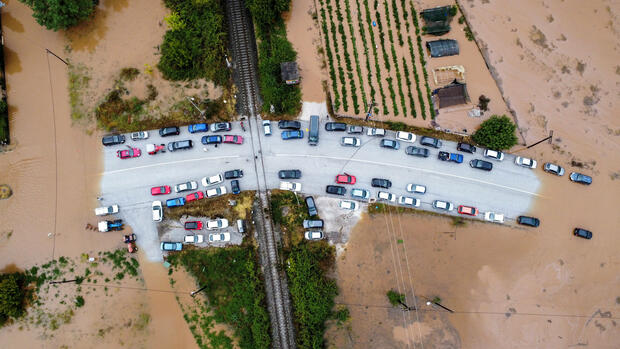Heavy rain had flooded 720 square kilometers of land in the Thessalian plain.
(Photo: Reuters)
Athens Greek Prime Minister Kyriakos Mitsotakis has promised the people in the flood areas of the province of Thessaly emergency aid and a quick reconstruction of the destroyed houses and infrastructure. “Whatever we have lost, the state and the citizens, we will rebuild better together,” Mitsotakis said at the weekend in Thessaloniki, northern Greece.
Storm “Daniel” caused devastating floods in Greece at the beginning of September. It is the same storm that hit the coast of Libya with renewed force a week later, where thousands of people died or are missing.
In Greece, days of heavy rain flooded 720 square kilometers of land in the Thessalian plain, an area the size of Hamburg.
Rainfall of 754 liters per square meter was measured locally in 24 hours. That was around four times the amount of precipitation during the Ahr Valley flood. At least 17 people drowned, including a young couple from Austria.
The plain of Thessaly is considered Greece’s breadbasket and contributes around five percent to the gross domestic product (GDP). Now many farmers are left with nothing. They lost everything: house and farm, fields, animals and machines.
The EU is promising aid funds of more than two billion euros
The first emergency aid for affected residents amounting to 25 million euros was paid out last Friday, said Mitsotakis. Economy and Finance Minister Kostis Chatzidakis does not yet want to put a figure on the damage, but says: “It runs into the billions.”
His government wants to stick to its fiscal goals.
(Photo: IMAGO/Xinhua)
The destruction of the infrastructure can only be recorded once the water has receded. Unofficial estimates put the damage at around six billion euros. That would be three percent of Greece’s GDP.
>> Read also: Climate researcher Latif: “We measured precipitation that has never happened before in Europe”
Last week, EU Commission President Ursula von der Leyen promised Greece aid totaling 2.25 billion euros. But the disaster is putting the Conservative government in financial distress. From next year onwards, the rules of the Stability Pact will apply again. This means less room for maneuver in the household.
Finance Minister Chatzidakis is now preparing a supplementary budget of around 600 million euros for emergency aid. Despite the costs of the flood, the government will stick to its fiscal goals, says Chatzidakis: “If we were to send the message now that we are returning to a lax budget policy and the mistakes of the past, it would be a shame after the sacrifices and progress of the past few years .”
Prime Minister Mitsotakis also assured in a press conference on Sunday that Greece would generate a primary surplus of 0.7 percent of GDP this year, as planned in the stability program. “This fiscal target is not up for discussion,” emphasized the head of government. The funds set aside in the budget for natural disasters will be doubled from 300 to 600 million euros, Mitsotakis announced.
The overnight tax for tourists increases to six euros in five-star hotels
The government wants to ask holidaymakers to pay for the increase: the overnight tax in Greek hotels, which is currently 50 cents to four euros per night per guest, will be increased to 1.50 euros in three-star hotels and six euros in five-star hotels. houses increased.
The flood disaster is also affecting throughput in the port of Piraeus, the largest container port in the Mediterranean. From here several freight trains with containers left for Central Europe every day. Now the railway line in Thessaly has been largely destroyed over a length of around 50 kilometers. According to government information, it will take at least two months before the route is passable again.
>> Read also: This is how great the flood damage is in Germany and Europe
Prime Minister Mitsotakis was only elected to a second term in June’s parliamentary election, but the flood is putting him under political pressure. After the worst train accident in the country’s history in February and Europe’s largest forest fire in August, the floods are the third major disaster this year.
When he was first elected in 2019, Mitsotakis promised a modernization of public administration and a more efficient state. Now many people in the fire and flood areas feel alone.
According to a survey published last week, 61 percent of respondents are dissatisfied with the work of the conservative government. Two out of three respondents see the country “on the wrong path”.
The ruling party New Democracy could soon feel the bad mood at the polls: local and regional elections will take place in Greece in four weeks. They are traditionally considered a political mood barometer.
More: What is behind the current extreme weather?
